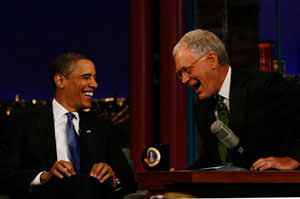Obama TV: How the President Revived Health Care
By monopolizing the airwaves with his calm rationality, President Obama has retaken control of the national health care debate, which was beginning to descend into ideological hysteria.By monopolizing the airwaves with his calm rationality, President Obama has retaken control of the national health care debate.
President Barack Obama has been a calming force in the debate over health care reform, bringing a tone of rationality to counter the influence of right-wing talk radio, Fox News and the Republicans’ staged “grass-roots” town hall meetings.
He’s not turning the other cheek. Rather, he’s sticking it to his critics with intelligence and wit.
It’s easy to criticize Obama as he becomes the public face of health reform. He is annoyingly general. The reform bill he is likely to sign will be a hodgepodge of compromises, some terrible. But we should be thankful for the civilized tone that Obama is bringing to a debate that was beginning to descend into ideological hysteria and unrelated arguments over race.
Take, for example, how he discusses race, which oddly has been thrust into the debate. Rather than fall into the news channels’ pointless chatter over race and health care, Obama chose another route — humor mixed with inspirational words.
He was funny when David Letterman brought up the idea that criticism of Obama was tinged with racism. Obama said, “I think it’s important to realize that I was actually black before the election. This is true.”
He was inspirational in his speech to the United Nations on Wednesday: “As an African-American, I will never forget that I would not be here today without the steady pursuit of a more perfect union in my country. That guides my belief that, no matter how dark the day may seem, transformative change can be forged by those who choose the side of justice. And I pledge that America will always stand with those who stand up for their dignity and their rights — for the student who seeks to learn; the voter who demands to be heard; the innocent who longs to be free; and the oppressed who yearns to be equal.”
On Sunday he was civilized and good-tempered as he and George Stephanopoulos tangled on ABC’s “This Week.”
Stephanopoulos said Obama’s demand that Americans with incomes above a certain level buy health insurance amounted to a tax increase. “That’s not true, George,” said Obama, “ … for us to say that you’ve got to take a responsibility to get health insurance is absolutely not a tax increase.”
“I don’t think I’m making it up. Merriam-Webster’s dictionary: ‘Tax, a charge, usually of money, imposed by authority on persons or property for public purposes,’ ” said Stephanopoulos.
“George, the fact that you looked up Merriam’s dictionary, the definition of tax increase, indicates to me that you’re stretching a little bit right now,” replied Obama. “Otherwise, you wouldn’t have gone to the dictionary to check on the definition.”
This approach has paid off. Most of the reservoir of good will that accompanied Obama’s election and inauguration remains. True, independent support, crucial to Obama’s victory in November, is dropping and the Afghanistan war is increasingly unpopular. But this week’s Wall Street Journal/NBC News poll showed that the president’s approval rating has held at 51 percent since August, despite the town hall barrage, magnified by Fox and right-wing radio talkers. This is also reflected in a Gallup Poll survey that shows him with a 53 percent approval rating. On health care, the Journal/NBC poll showed Obama picking up support after a summer that some in the media said would sink him.
The president knows that words count. He was smart to monopolize the news interview shows Sunday and appear on the Letterman show later in the week. He dominated the national debate.
And look what happened to that congressman who called him a liar. Joe Wilson is last week’s news, as forgotten as Joe the Plumber of the presidential campaign. That’s the 24-hour news cycle. Hot today, nobody tomorrow. By contrast, Obama, on television almost every day, has become an upbeat presence, part of our lives.
This is important for the future of health care reform in decades ahead as well as to the present deliberations.
Whatever legislation is signed by Obama, hopefully this year, will be changed and strengthened over the years. That’s what happened to Social Security and Medicare.
Franklin D. Roosevelt and Lyndon B. Johnson knew that the signings of those bills were just beginnings. And they also understood that presidential words—positive, hopeful—would convey the spirit of the legislation. Future generations would view the programs positively. The partisan strife and the venom of die-hard Republicans were forgotten with a sweep of the Roosevelt and Johnson pens — and the receipt of the first benefits. A grateful nation supported expansion of Social Security and Medicare.
Words matter. They set the tone. Roosevelt’s sunny optimism accomplished this during the Depression and when he led the nation into World War II. That is why President Obama’s conduct during this historic health care fight—his words, his optimistic manner—may be more important than all the details of the bill he eventually signs.
Your support matters…Independent journalism is under threat and overshadowed by heavily funded mainstream media.
You can help level the playing field. Become a member.
Your tax-deductible contribution keeps us digging beneath the headlines to give you thought-provoking, investigative reporting and analysis that unearths what's really happening- without compromise.
Give today to support our courageous, independent journalists.









You need to be a supporter to comment.
There are currently no responses to this article.
Be the first to respond.